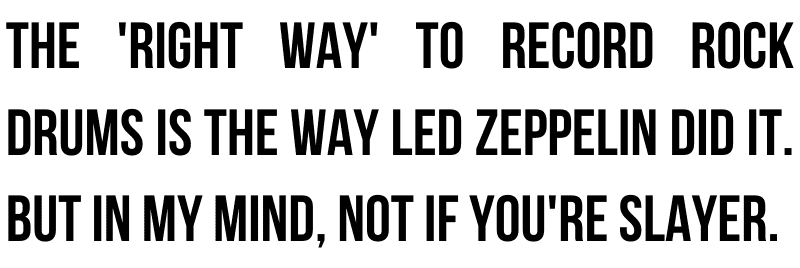In a new interview for Channel 4 News, legendary producer Rick Rubin looked back on his collaboration with Slayer which resulted in, what a huge portion of metal fans would consider, three of their finest albums. The first one where Rubin worked with Slayer was 1986’s “Reign in Blood.”
While talking about Slayer, Rubin reflected on how this seminal metal record got its unique sound. Looking back on his approach to working with the band, the producer said (transcript via Ultimate Guitar):
“When you treat everything the same, it waters down what it is. Speed metal was a new thing. The people who were recording speed metal up until ‘Reign in Blood’, recorded speed metal more like other hard rock or heavy metal. And it’s different. It’s all different. Everything we make is different.“
It may feel controversial to some but Rubin compared it to working with rap and R&B artists, saying:
“If you look at it in hip hop, if you make it like it’s an R&B record – it’s an R&B record with somebody rapping. If you make it like going to the hip hop club, It’s hip hop.“

Getting back to metal music, he continued:
“With speed metal, if you treat it like Black Sabbath, it won’t do what Slayer does — in that case, Slayer play super fast. And the nature of things that are fast is, they come very close together, like the kick drums are super fast.“
“When you listen to Led Zeppelin records, the drum goes [slower]. So if you have someone playing [fast], and you treat it like Led Zeppelin, it’s just going to be a blur and noise; you won’t hear any of it.“
According to Rubin’s words, it was actually his own lack of experience that made this legendary Slayer album so good. As he puts it, the “right way” to produce a metal album may not always be the best for every band.
Breaking away from the already established rules can do wonders and that’s kind of what happened with “Reign in Blood,” although due to Rubin’s inexperience. He concluded:
“That’s what was happening up until ‘Reign in Blood’ — and this is really in each case. It comes from my lack of experience. Lack of the ‘right way’ to do it. The ‘right way’ to record rock drums is the way Led Zeppelin did it. But in my mind, not if you’re Slayer.”
“So in some ways, because I wasn’t experienced enough to know ‘this is how you do it’, I’m listening to it for what it is, and it’s this very precise type of thing. And you want to hear the precise tightness of it. And up until that point, no one had recorded it that way.”
Released in 1986, Slayer’s “Reign in Blood” is widely considered as one of the biggest metal records of all time. Although it belongs to the thrash metal movement, album is also looked upon as a game-changer for all the “extreme” metal subgenres.
But although the guys from Slayer were very satisfied with their work with the producer, it’s not a secret that Rick Rubin’s ways are far from conventional in the music industry. What’s more, some of the most respected metal musicians have complained that they didn’t really think that Rubin did a particularly good job. And thus, Rubin’s reputation for being nothing more than a big name that’s used to promote the album grew over the years.
For instance, in a last year’s interview, Black Sabbath bassist Geezer Butler looked back on the band’s final album “13” which also marked the first time that they collaborated with Rubin. As Geezer explains, he wasn’t entirely satisfied with how the record turned out, saying:
“Some of it I liked, some of it I didn’t like particularly. It was a weird experience, especially with being told to forget that you’re a heavy metal band. That was the first thing [Rick] said to us.”
“He played us our very first album, and he said, ‘Cast your mind back to then when there was no such thing as heavy metal or anything like that, and pretend it’s the follow-up album to that,’ which is a ridiculous thing to think.”
When reminded of how other musicians also complained about Rubin’s way of work, Geezer added:
“I still don’t know what he did. It’s, like, ‘Yeah, that’s good.’ ‘No, don’t do that.’ And you go, ‘Why?’ [And he’d say], ‘Just don’t do it.'”
“I think Ozzy one day went nuts ’cause he’d done, like, 10 different vocals, and Rick kept saying, ‘Yeah, that’s great, but do another one.’ And Ozzy was, like, ‘If it’s great, why am I doing another one?'”
“He just lost it. And that’s the way it was. Tony wasn’t happy with some of the stuff he was trying to make him play. He was making Tony get 1968 amps — as if that’s gonna make it sound like back in 1968.”
“It’s mad. But it’s good for publicity and it’s good for the record company. If you’ve got Rick Rubin involved, then it must be good, kind of thing.”
And on top of all that, Ozzy Osbourne also addressed “13” and Rubin in a 2022 interview, even claiming that he didn’t even have a good time while recording the album. Asked whether he enjoyed the process, The Prince of Darkness replied:
“Not really, because to be perfectly honest, I didn’t really get a charge from the album. Although Rick Rubin is a good friend of mine, I wasn’t really… I was just singing.
“It was like stepping back in time, but it wasn’t a glorious period. Though Geezer [Butler] did a lot of lyric writing for me, which he’s very, very good at. It wasn’t an earth-shattering experience for me.”
He also added:
“But I’ll say, [13] wasn’t recorded the way Black Sabbath recorded records. We’d gone right back past the point where we took charge, back to when someone else had full control of our recording. Which we never did from ‘Vol. 4’ onwards.”
Photos: WanderingTrad (Slayer Tuska 2019 (3)), Jason Mogavero (RickRubinSept09)


